VW Tiguan VS Subaru Forester – Specs, Efficiency & Price Comparison
Which model is the better choice – the VW Tiguan or the Subaru Forester? We compare performance (272 HP vs 136 HP), boot capacity (652 L vs 508 L), efficiency (0.40 L vs 8.10 L), and of course, the price (32800 £ vs 34700 £).
Find out now which car fits your needs better!
The VW Tiguan (SUV) is powered by a Petrol MHEV, Plugin Hybrid, Diesel or Petrol engine and comes with a Automatic transmission. In comparison, the Subaru Forester (SUV) features a Petrol MHEV engine and a Automatic gearbox.
When it comes to boot capacity, the VW Tiguan offers 652 L, while the Subaru Forester provides 508 L – depending on what matters most to you. If you’re looking for more power, you’ll need to decide whether the 272 HP of the VW Tiguan or the 136 HP of the Subaru Forester suits your needs better.
There are also differences in efficiency: 0.40 L vs 8.10 L. In terms of price, the VW Tiguan starts at 32800 £, while the Subaru Forester is available from 34700 £.
Compare all the key specs now and find out which model fits your lifestyle best!
VW Tiguan
The VW Tiguan presents itself as a versatile and practical option in the SUV market, combining a stylish design with a spacious and comfortable interior. It offers a smooth driving experience, making it well-suited for both urban environments and longer journeys. With its focus on safety and innovative technology features, the Tiguan remains a compelling choice for families and adventurers alike.
details @ Volkswagen
@ Volkswagen
 @ Volkswagen
@ Volkswagen
 @ Volkswagen
@ Volkswagen
 @ Volkswagen
@ Volkswagen
 @ Volkswagen
@ Volkswagen
 @ Volkswagen
@ Volkswagen
Subaru Forester
The Subaru Forester is a versatile SUV known for its impressive off-road capabilities and practical design. With a spacious interior and advanced safety features, it offers comfort and security for both city driving and outdoor adventures. Its reliable performance and all-wheel-drive system make it a popular choice among those who appreciate a combination of functionality and rugged charm.
details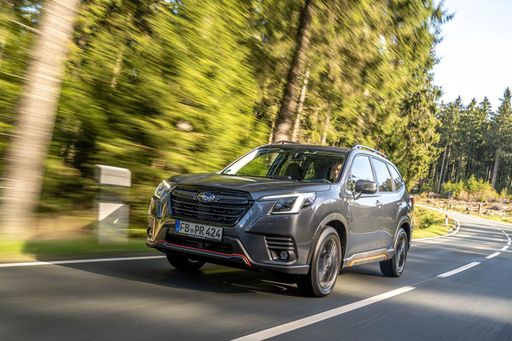 @ Subaru
@ Subaru
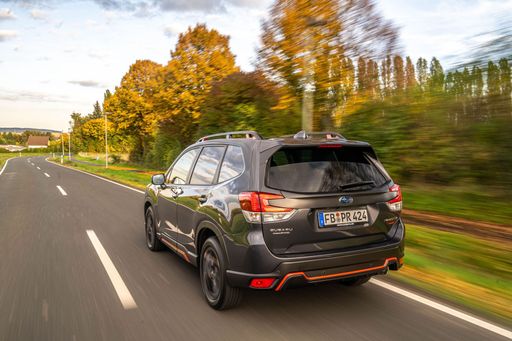 @ Subaru
@ Subaru
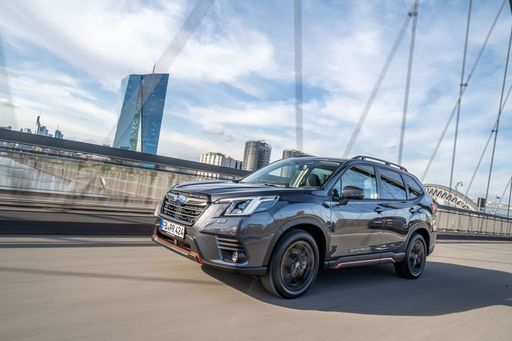 @ Subaru
@ Subaru
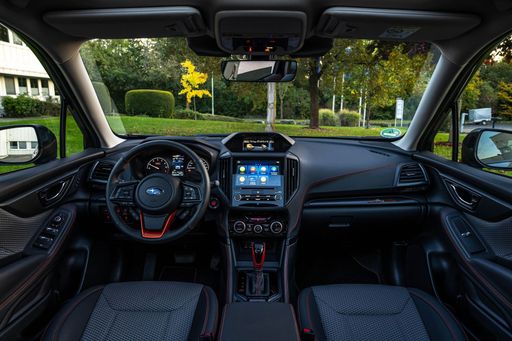 @ Subaru
@ Subaru
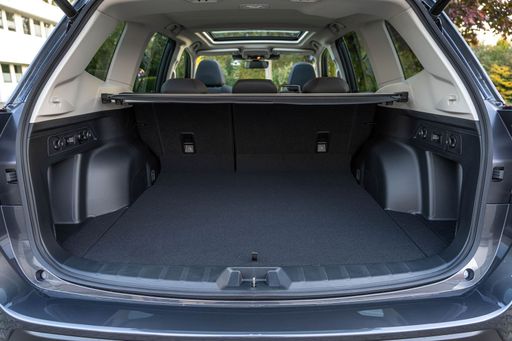 @ Subaru
@ Subaru

|

|
|
|
|
Costs and Consumption |
|
|---|---|
|
Price
32800 - 51000 £
|
Price
34700 - 42200 £
|
|
Consumption L/100km
0.4 - 8.5 L
|
Consumption L/100km
8.10 L
|
|
Consumption kWh/100km
-
|
Consumption kWh/100km
-
|
|
Electric Range
119 - 129 km
|
Electric Range
-
|
|
Battery Capacity
19.70 kWh
|
Battery Capacity
-
|
|
co2
8 - 193 g/km
|
co2
183 g/km
|
|
Fuel tank capacity
45 - 58 L
|
Fuel tank capacity
48 L
|
Dimensions and Body |
|
|---|---|
|
Body Type
SUV
|
Body Type
SUV
|
|
Seats
5
|
Seats
5
|
|
Doors
5
|
Doors
5
|
|
Curb weight
1599 - 1890 kg
|
Curb weight
1693 - 1739 kg
|
|
Trunk capacity
490 - 652 L
|
Trunk capacity
508 L
|
|
Length
4539 mm
|
Length
4670 mm
|
|
Width
1842 - 1859 mm
|
Width
1830 mm
|
|
Height
1656 - 1658 mm
|
Height
1730 mm
|
|
Payload
460 - 533 kg
|
Payload
446 - 492 kg
|
Engine and Performance |
|
|---|---|
|
Engine Type
Petrol MHEV, Plugin Hybrid, Diesel, Petrol
|
Engine Type
Petrol MHEV
|
|
Transmission
Automatic
|
Transmission
Automatic
|
|
Transmission Detail
Automat. Schaltgetriebe (Doppelkupplung)
|
Transmission Detail
-
|
|
Drive Type
Front-Wheel Drive, All-Wheel Drive
|
Drive Type
All-Wheel Drive
|
|
Power HP
130 - 272 HP
|
Power HP
136 HP
|
|
Acceleration 0-100km/h
5.9 - 10.6 s
|
Acceleration 0-100km/h
12.20 s
|
|
Max Speed
198 - 242 km/h
|
Max Speed
188 km/h
|
|
Torque
220 - 400 Nm
|
Torque
182 Nm
|
|
Number of Cylinders
4
|
Number of Cylinders
4
|
|
Power kW
96 - 200 kW
|
Power kW
100 kW
|
|
Engine capacity
1498 - 1984 cm3
|
Engine capacity
1995 cm3
|
General |
|
|---|---|
|
Model Year
2024
|
Model Year
2025
|
|
CO2 Efficiency Class
E, B, F, G
|
CO2 Efficiency Class
G
|
|
Brand
VW
|
Brand
Subaru
|
VW Tiguan
Introducing the VW Tiguan: A Blend of Style and Innovation
The VW Tiguan has consistently been a popular choice among SUV enthusiasts, combining practicality with a touch of elegance. In the latest iteration, Volkswagen has continued this tradition with a range of technical updates and innovations.
Powertrains: Versatility Meets Efficiency
The VW Tiguan comes with a variety of engine options, catering to different preferences and needs. From the efficient petrol mild-hybrid variants to the environmentally friendly plug-in hybrids, and the robust diesel engines, there is something for everyone. The power output ranges from a modest 130 PS to an impressive 272 PS, ensuring that drivers can enjoy a powerful and dynamic driving experience.
Innovation remains at the heart of the Tiguan’s engineering. The plug-in hybrid models, for example, boast an electric range of up to 113 km, making them ideal for those looking to reduce their carbon footprint while still enjoying the flexibility of a traditional engine.
Advanced Transmission and Drivetrain
Equipped with a smooth and responsive automatic transmission, the Tiguan ensures a comfortable drive. The dual-clutch gearbox provides quick and seamless gear changes, enhancing the driving experience. Additionally, the Tiguan is available in both front-wheel and all-wheel drive configurations, offering excellent traction and stability across different driving conditions.
Performance and Efficiency
The Tiguan's performance capabilities are complemented by its efficiency. With fuel consumption as low as 0.4 L/100km for hybrid models, owners can enjoy long trips with fewer stops for refuelling. The CO2 emissions are also impressively low, aligning with modern environmental standards and expectations.
Design and Dimensions
The Tiguan’s aesthetic appeal is undeniable, with a robust character that exudes confidence and sophistication. Its dimensions—4,539mm in length, 1,842 to 1,859 mm in width, and up to 1,658mm in height—provide ample interior space, making it a versatile vehicle for families and adventure seekers alike.
Practicality is further emphasised by its sizeable boot space, ranging from 490 to 652 litres, ensuring plenty of room for luggage or shopping.
Safety and Technology
Volkswagen has not compromised on safety or technology. The Tiguan is equipped with the latest driver assistance systems, ensuring a safe journey for its occupants. Features like adaptive cruise control, lane assist, and emergency braking provide an extra layer of protection.
Pricing and Value
Starting from €38,250 to €59,535, the Tiguan offers a range of specifications and features to match different budgets. When considering the advanced technology, engine options, and the premium feel of the cabin, it presents excellent value for money.
Conclusion: The Ultimate SUV Experience
The VW Tiguan continues to impress with its blend of innovative technology, performance, and practicality. Whether you’re looking for an eco-friendly hybrid with a long electric range or a powerful diesel for longer hauls, the Tiguan provides an all-encompassing solution. With its refined design and superior comfort, it remains a leading choice in the SUV segment.
Subaru Forester
The Subaru Forester: A Staple of Innovation
The Subaru Forester continues to stand out as a robust and reliable choice in the SUV market. Known for its rugged capabilities and thoughtful design, the Forester combines traditional Subaru strengths with modern technological innovations. As an all-wheel-drive vehicle, it promises safety, efficiency, and performance in a dynamic package.
Engineering and Performance
At the heart of the Subaru Forester lies its 2.0-litre petrol mild-hybrid engine, delivering a stout 150 PS and 194 Nm of torque. This power is channelled through an advanced CVT gearbox, ensuring smooth and responsive acceleration. The vehicle can sprint from 0 to 100 km/h in approximately 11.8 seconds, showing its agility despite its SUV stature.
One of the highlights is its all-wheel-drive system, designed to offer excellent traction and stability across diverse driving conditions. The Forester provides a top speed of 188 km/h, ensuring an exciting drive whether you're navigating city streets or venturing onto the open road.
Technical Specifications
The Forester maintains a balance between practicality and efficiency. With a fuel consumption rate of 8.1 L/100km and CO2 emissions positioned at 185 g/km, this SUV provides an efficient yet powerful performance. The mild-hybrid system is supported by a 0.6 kWh battery, offering enhanced fuel economy and reducing environmental impact.
Weighing between 1658 and 1693 kg, the Forester is designed to offer both robustness and fuel efficiency. It boasts a generous cargo capacity of 509 litres, perfect for both daily use and adventurous getaways. The exterior dimensions—4640 mm in length, 1815 mm in width, and 1730 mm in height—strike a balance between presence and manoeuvrability.
Design and Interior Features
With a sleek and modern design, the Forester is available in several trims catering to different customer preferences, such as the Trend Lineartronic, Active Lineartronic, and the luxurious Edition Exclusive Cross Lineartronic. The interior space is noteworthy, providing comfortable seating for five passengers, making it an excellent option for family journeys.
Safety and convenience are paramount in the Forester, featuring driver assistance systems designed to support and protect. The model comes equipped with state-of-the-art technology to keep occupants entertained and connected, enhancing the driving experience significantly.
Affordability and Running Costs
Price-wise, the Subaru Forester ranges from €37,790 to €46,450, aligning with its features and capabilities. The monthly costs for ownership may vary between €1125 and €1221, with costs per kilometre ranging from 45 to 48.9 cents. For those seeking an SUV that's a combination of comfort, reliability, and reasonable running costs, the Forester presents a persuasive choice.
Conclusion
The Subaru Forester remains a solid contender in the SUV segment, offering a mix of performance, practicality, and modern features. This vehicle is engineered for those who desire a dependable and versatile companion for all their adventures. With its blend of innovative technologies and classic Subaru reliability, the Forester continues to be an attractive option for discerning drivers.
The prices and data displayed are estimates based on German list prices and may vary by country. This information is not legally binding.
